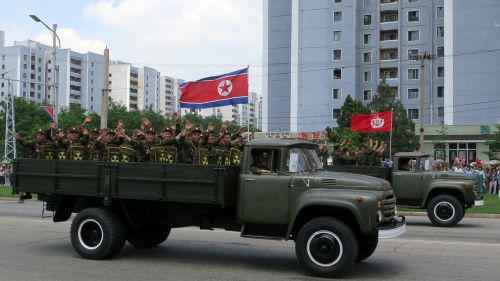Americans Have "Three Cannots" on North Korea's Nuclear Weapons

Karl Friedhoff examines the United States' nuanced understanding of policy options on North Korea's nuclear program.
North Korea occupies an unusual space in the American imagination. It is simultaneously a growing nuclear threat, but its leader is portrayed as a caricature ripe for an easy punchline. It is an impoverished state always on the brink of starvation and a hermetically sealed country that produces lurid tales of executions. Many Americans cannot find the country on the map. Yet the American public has a surprisingly nuanced understanding of the current US policy options on North Korea’s nuclear program. Taken together, these attitudes form the "Three Cannots"—cannot negotiate it away, cannot bomb it, cannot accept it.
First, Americans are broadly skeptical that negotiations will lead to North Korea’s denuclearization. In 2020, just 13 percent of Americans said that negotiations would lead to North Korea giving up its nuclear weapons. That was largely a bipartisan consensus with 19 percent of Republicans and 10 percent of Democrats in agreement. This public perception aligns well with the lackluster US track record at the negotiation table with North Korea. Every administration since Clinton has made denuclearizing North Korea a priority and all have failed. President Trump claimed success after meeting Kim Jong Un but he too fell short.
Second, the American public does not see a military solution as acceptable. There is only minority support for the least-involved military option—airstrikes against North Korea’s nuclear production facilities. Three in ten Americans (29%) support this option, including 39 percent of Republicans and 20 percent of Democrats. Those numbers may be worryingly high considering the potential costs but are actually new lows; in 2017 41 percent of Americans supported airstrikes. That included a majority of Republicans (56%) and 34 percent of Democrats.
One-quarter (24%) of Americans support sending US troops to destroy North Korea’s nuclear facilities. Again, another new low, down from 29 percent in 2017. While each administration has "kept all options on the table," Steve Bannon—of all people—had it right: there just is no military option in which millions in Seoul don’t die in the opening phases of any conflict.
But the least palatable option for the American public is to simply accept that North Korea will continue to produce additional nuclear weapons. Just 11 percent of Americans support this option, including 8 percent of Republicans and 13 percent of Democrats. It is also an option that has proven repeatedly unpalatable to US administrations, putting each successive president in the same cycle of escalation, negotiation, compromise, and failure.
These "Three Cannots" are not written in stone. But there is unlikely to be a significant shift given the historical record between the two countries and the stalemate that remains in place. One outcome the public may be willing to accept is an agreement in which North Korea keeps it current weapons with an agreement to produce no more fissile material or weapons. While fewer than three in ten (28%) Americans support that potential outcome—roughly the same as for military options—it does not come with the immediate downside risk of military options. And with a concerted push from a US administration willing to reach such a deal, that support would likely grow over time.

